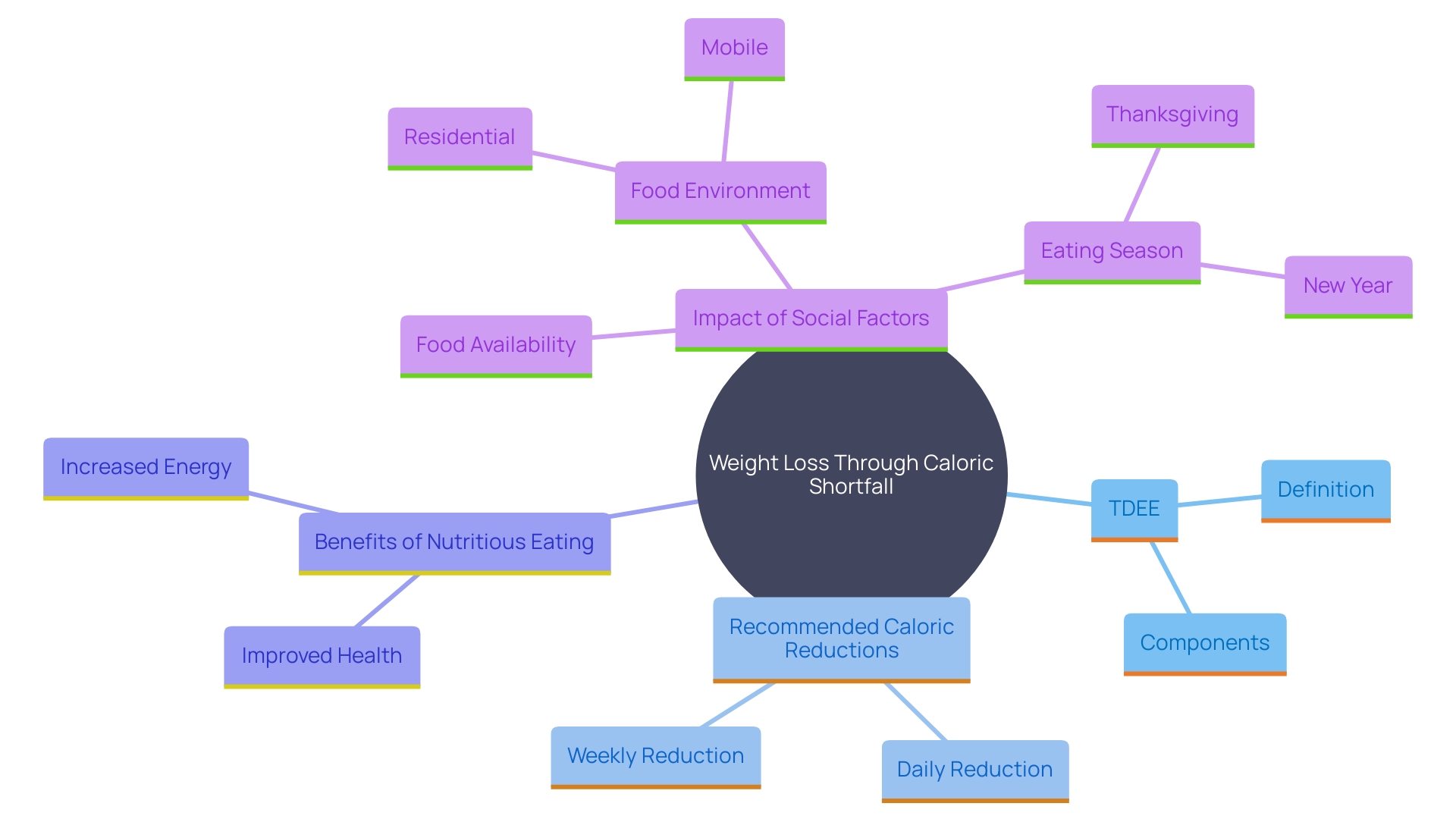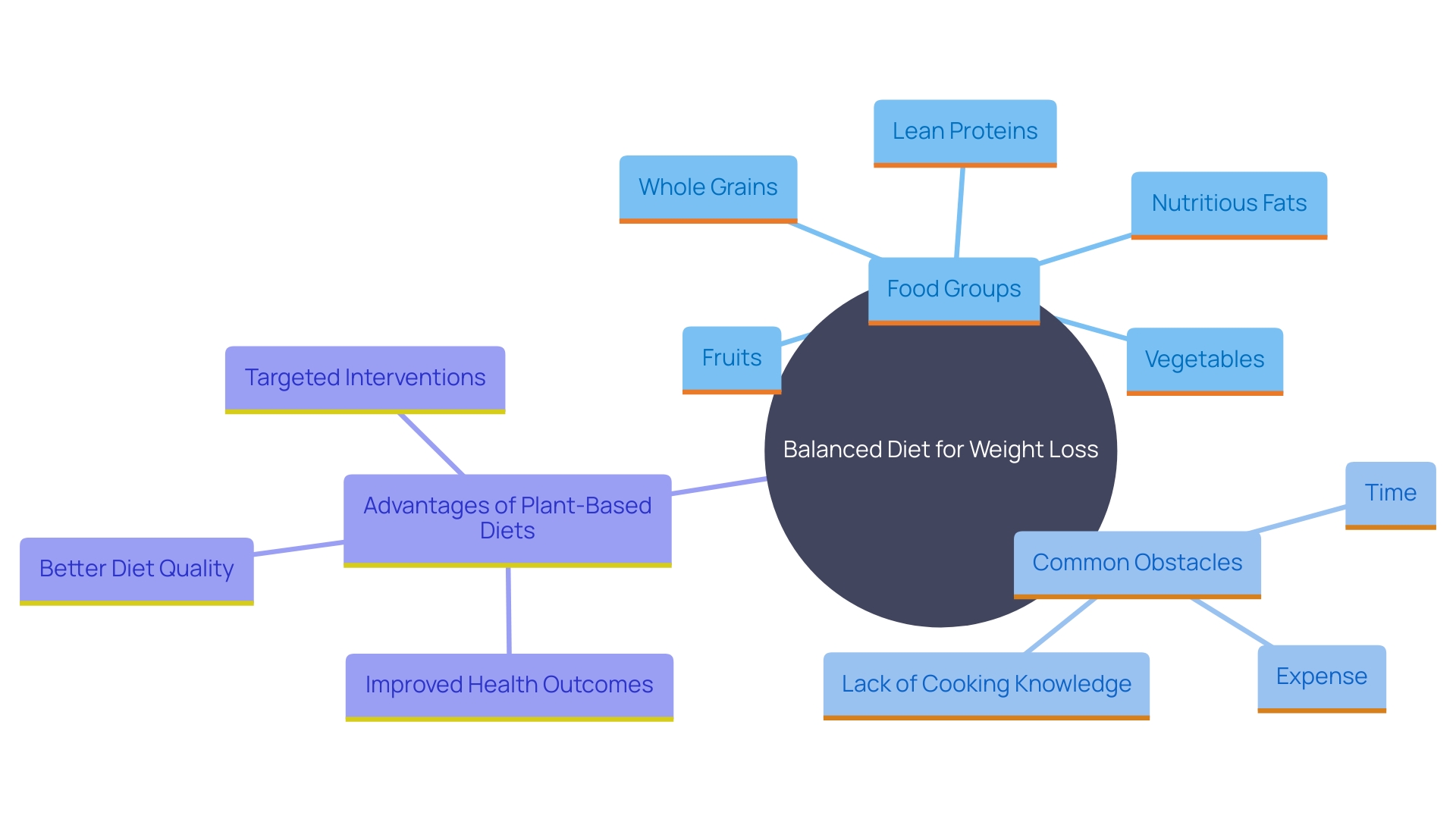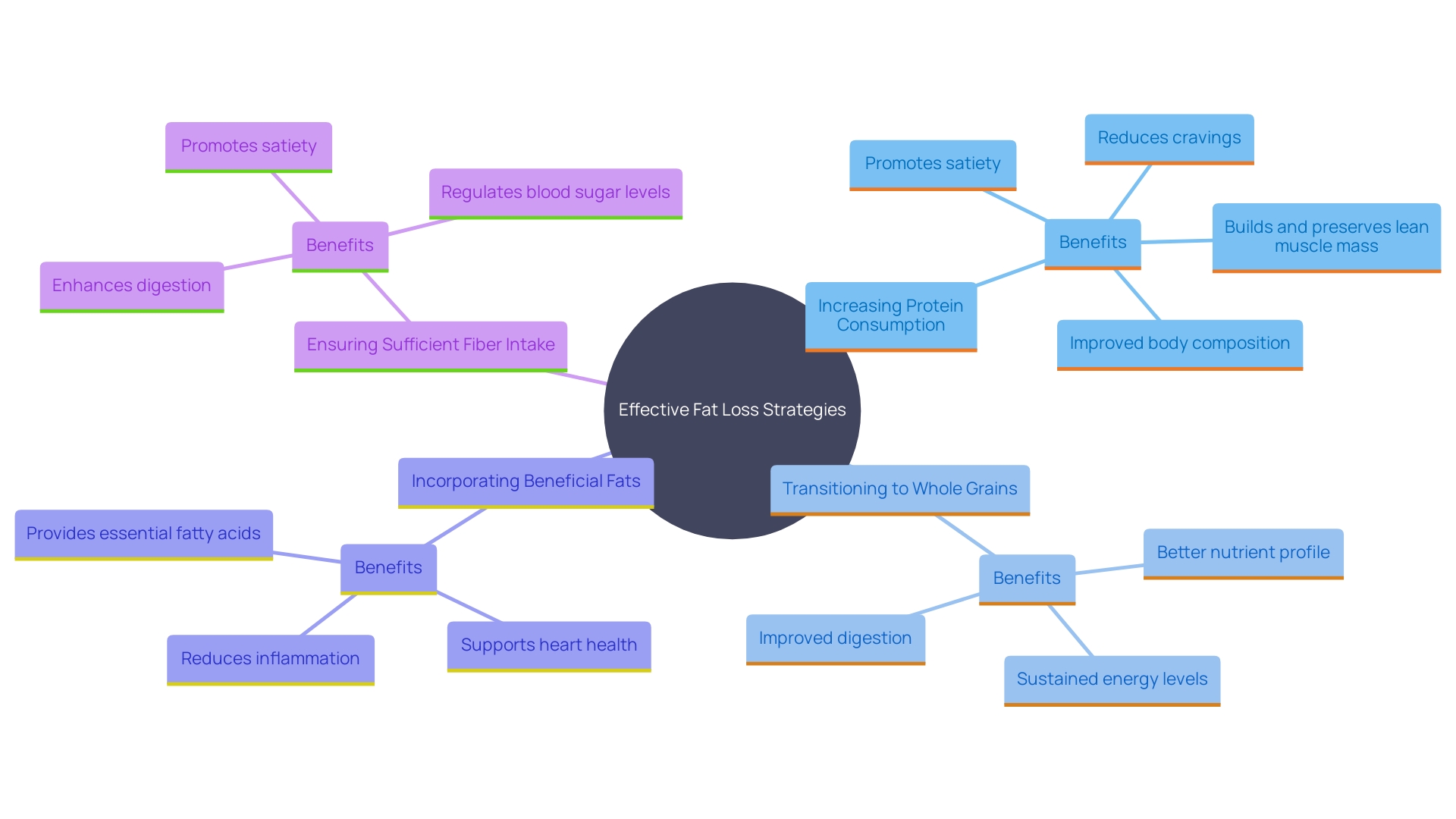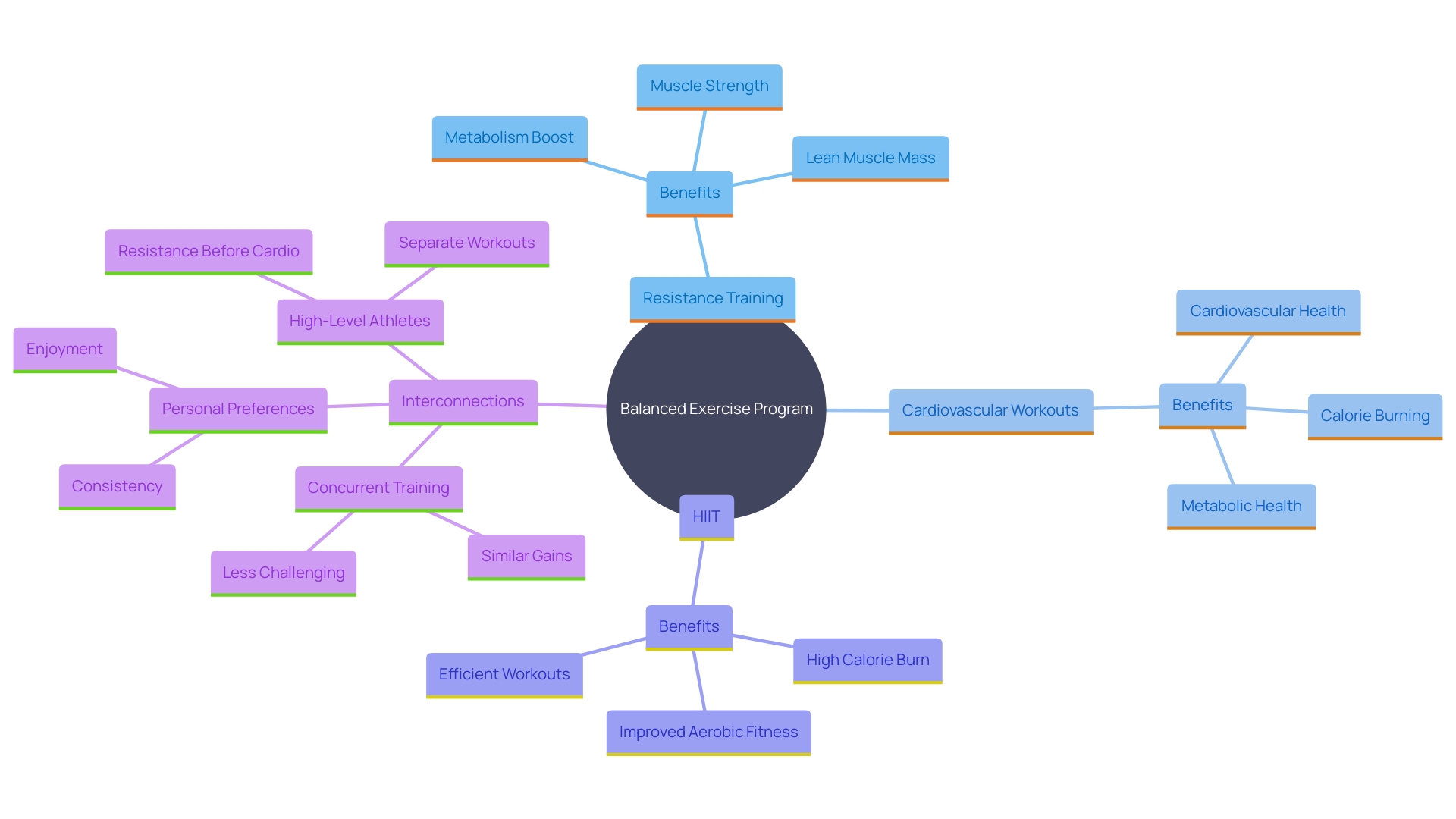Introduction
Achieving rapid weight loss requires more than just determination; it necessitates a clear understanding of caloric deficits and a strategic approach to nutrition and exercise. This comprehensive guide will explore the essential components of effective weight loss, starting with the concept of caloric deficit, which involves consuming fewer calories than your body expends. By targeting a reasonable caloric deficit, individuals can achieve sustainable weight loss while preserving muscle mass and overall health.
Additionally, the importance of a balanced diet cannot be overstated, and we will delve into how incorporating a variety of nutrient-dense foods can enhance weight loss efforts. Furthermore, targeted nutritional strategies, including boosting protein intake and transitioning to whole grains, will be discussed as powerful tools for weight management. Exercise plays a crucial role in this journey, and various strategies, from resistance training to high-intensity interval training (HIIT), will be highlighted for their effectiveness in accelerating weight loss.
Finally, practical tips for successful weight loss, such as mindful eating, adequate sleep, and stress management, will be shared to support a holistic approach to achieving and maintaining a healthy weight. By combining these elements, the pathway to weight loss becomes not only achievable but also sustainable, paving the way for long-term health and well-being.
Understanding Caloric Deficit for Weight Loss
To attain quick loss of mass, it's essential to understand the idea of a caloric shortfall, which entails consuming fewer calories than your body expends. Begin by determining your Total Daily Energy Expenditure (TDEE) utilizing an online calculator that takes into account your age, gender, weight, height, and activity level. Aim for a caloric reduction of approximately 500 to 1000 calories each day to shed about 1 to 2 pounds weekly, which is a healthy and sustainable rate.
A conservative method of consuming 300 fewer calories can lead to approximately half a pound of fat loss each week, while a reduction of 300-500 calories generally results in a loss of half a pound to a pound of fat weekly. This moderate shortfall is generally a good balance, promoting muscle preservation and gym performance. For more significant results, a 500-750 calorie deficit can lead to burning 1 to 1.5 pounds of fat per week, still maintaining muscle mass and overall sustainability.
Adopting nutritious eating habits can significantly influence weight loss efforts. According to the Dietary Guidelines for Americans 2020–2025, a nutritious eating plan emphasizes fruits, vegetables, whole grains, and low-fat or fat-free dairy products. It also includes a variety of protein sources like lean meats, seafood, legumes, nuts, and seeds. Individuals with beneficial eating habits often live longer and face a reduced risk of serious health problems like heart disease, type 2 diabetes, and obesity. For individuals with chronic diseases, healthy eating can help manage conditions and prevent complications.
'Recent studies show that specific eating patterns, such as dining late at night, can boost hunger and decrease energy usage, which adversely affects efforts to slim down.'. Consequently, conscious eating and meal scheduling are crucial elements of a successful reduction strategy. Furthermore, comprehending the impact of social factors, such as availability of nutritious food, is vital in tackling obesity, especially in children.
By concentrating on a balanced caloric deficit and integrating nutritious eating practices, achieving and sustaining reduction becomes a more attainable goal.

Importance of Balanced Diet
A balanced diet is essential for effective weight loss. Embrace a variety of foods from all food groups, including fruits, vegetables, whole grains, lean proteins, and nutritious fats. This diverse approach ensures you receive the necessary nutrients while maintaining a caloric deficit. Avoid extreme diets that cut out entire food groups, as they can lead to nutritional deficiencies and are often unsustainable. As stated by the Cleveland Clinic, the most frequent obstacles to a better diet include expense, insufficient time to prepare meals, and a lack of knowledge on how to cook nutritious foods. Additionally, it’s important to consider individual preferences and life circumstances when making dietary changes. Research from Omada’s clinical team, which surveyed 1,658 members, shows that balanced dietary patterns and increased physical activity can reduce disease risk. Sustaining a healthy body composition through plant-based diets, including vegetarian and vegan options, has proven effective in reducing the risk of insulin resistance, inflammation, and diabetes.

Key Nutritional Strategies for Weight Loss
Implementing focused dietary approaches can enhance your fat loss efforts. Increasing protein consumption is essential as it improves fullness and aids in maintaining muscle mass during fat loss, a point supported by the Mayo Clinic's suggestion that 10% to 35% of daily caloric intake should derive from proteins. For more active individuals, the intake should increase to 1.1 grams per kilogram of body mass.
Transitioning from refined carbohydrates like white bread and sugary snacks to whole grains is another effective strategy. This aligns with the Dietary Guidelines for Americans 2020–2025, which emphasize the importance of fruits, vegetables, whole grains, and fat-free or low-fat dairy products. Furthermore, including beneficial fats from sources such as avocados, nuts, and olive oil can further support your journey.
Ensuring sufficient fiber intake from fruits and vegetables aids digestion and keeps you feeling full longer. This method not only aids in shedding pounds but also encourages lasting health advantages, such as a lowered risk of heart disease, type 2 diabetes, and obesity, as emphasized by many studies. In essence, a well-rounded and balanced diet is a powerful tool for achieving and maintaining a fit body.

Exercise Strategies for Weight Loss
Including physical activity in your schedule can greatly speed up body mass reduction. To maximize results, aim for a balanced combination of resistance training and cardiovascular workouts. Resistance training, such as weightlifting, is crucial for building muscle strength and size, which in turn boosts your metabolism. Enhanced metabolic rates lead to more efficient calorie burning, even during rest periods. Cardiovascular exercises, including activities like running, cycling, and swimming, are essential for burning calories and improving overall cardiovascular health.
High-Intensity Interval Training (HIIT) stands out as particularly effective. Research conducted at Qufu Normal University on college students living with obesity demonstrated that HIIT can lead to a notable reduction in body fat percentage. With an effect size of 0.37, HIIT has been proven to be highly efficient, even with shorter workout durations. Typically, HIIT sessions, which involve alternating between short bursts of intense activity and periods of rest, can burn more calories in a fraction of the time compared to traditional cardio.
A study published in the British Journal of Sports Medicine also highlights the importance of resistance training for improving physical function and metabolic health. The average exercise intervention duration is around 17 weeks, with most studies suggesting at least 3.5 sessions per week for optimal outcomes. Furthermore, participating in moderate-to-vigorous physical activity (MVPA) is crucial for sustaining a healthy body and avoiding the negative consequences of a sedentary lifestyle.
In the end, regardless of whether you distribute your exercises over the week or consolidate them into a few days, regular physical activity, along with a suitable diet, is essential for reaching and sustaining your goals related to body composition.

Additional Tips for Successful Weight Loss
To further improve your body reduction efforts, consider adopting these extra suggestions. Eat slowly and mindfully to allow your body to recognize when it’s full, which can help you avoid overeating. Make sure you’re obtaining sufficient rest each night; studies by Dr. Tasali emphasize that increasing sleep by merely 1.2 hours can greatly decrease energy consumption and aid in shedding pounds without altering physical activity or nutrition. Manage stress levels through activities like meditation or yoga. Mindfulness practices not only assist with stress but can also provide long-term advantages for mental well-being, potentially supporting management of body composition. Steer clear of fad diets and focus instead on making sustainable lifestyle changes that you can maintain in the long term. As Kimberly Gomer, a licensed nutritionist, indicates, successful reduction in mass often begins with the appropriate assistance, knowledge, and the capacity to implement enduring lifestyle modifications. Remember, weight loss is a gradual process, and losing about 1 to 2 pounds a week is more sustainable and effective.
Conclusion
Achieving rapid weight loss hinges on understanding and implementing a caloric deficit while embracing a balanced diet. By targeting a caloric deficit of 500 to 1000 calories a day, individuals can expect to lose weight at a healthy rate, preserving muscle mass and overall well-being. The importance of a diverse diet comprising fruits, vegetables, whole grains, and lean proteins cannot be overstated, as it not only supports weight loss but also enhances long-term health.
Moreover, targeted nutritional strategies, such as increasing protein intake and opting for whole grains, serve as effective tools in this journey. These strategies, combined with a commitment to regular exercise—particularly resistance training and high-intensity interval training (HIIT)—can significantly boost metabolic rates and accelerate weight loss. Consistency in both diet and exercise is paramount for achieving and maintaining weight loss goals.
In addition to these fundamental strategies, adopting mindful eating practices, ensuring adequate sleep, and managing stress levels play crucial roles in successful weight management. By steering clear of extreme diets and focusing on sustainable lifestyle changes, individuals can foster an environment conducive to lasting health and well-being. Embracing these principles will pave the way for not only achieving weight loss goals but also enjoying a healthier, more fulfilling life.




